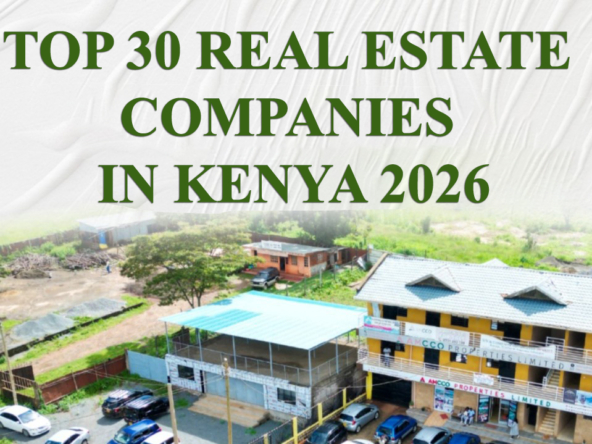Diaspora Real Estate Kenya: Your Ultimate Safe Investment Guide for 2025
For Kenyans living abroad and other East African citizens, investing back home is a powerful way to build wealth and maintain a connection to their roots. A substantial portion of remittances sent to Kenya is directed towards real estate, reflecting a growing trend among the diaspora to acquire property in their homeland. However, navigating the Kenyan property market from a distance presents unique challenges, particularly concerning trust and due diligence. This comprehensive guide is designed to empower you with safe investment strategies for Diaspora Real Estate Kenya, helping you capitalize on opportunities while mitigating risks in 2025.
Why Diaspora Real Estate Kenya is a Lucrative Opportunity
Kenya’s real estate market offers compelling reasons for diaspora engagement. The country’s economy is robust, with a stable pro-investment government and business-friendly regulatory reforms. This environment fosters significant growth in the property sector, making it an attractive destination for capital from across East Africa and beyond.
Key benefits that draw the diaspora to Diaspora Real Estate Kenya include:
- High Returns and Capital Appreciation: Kenya’s land and property values have shown consistent appreciation, often outpacing inflation. Prime residential markets have seen increased demand, with sale prices rising significantly.
- Diverse Investment Options: The market offers a wide range of choices, from residential apartments and townhouses to commercial office spaces, retail centers, and agricultural land, catering to various preferences and budgets.
- Rental Income Potential: With rapid urbanization and population growth, demand for rental properties is on the rise, presenting excellent opportunities for substantial rental yields.
- Tangible Asset: Unlike volatile financial instruments, land and property are physical assets that provide a sense of security and a lasting legacy.
- Regional Leadership: Kenya is a leading real estate hub in East Africa, attracting both local and pan-African players, benefiting from ongoing regional integration efforts.
Unique Challenges for Diaspora Real Estate Kenya Investors
Despite the attractive opportunities, investing in Diaspora Real Estate Kenya comes with specific challenges that require careful consideration and strategic planning. Addressing these challenges is key to a secure and successful investment:
- Trust Deficit: A significant challenge holding back many Kenyans abroad is a trust deficit. Diaspora investors often rely on friends or relatives for property identification and management, which can sometimes lead to exploitation, misrepresentation of property information, or misappropriation of funds.
- Vulnerability to Scams: Without physical presence, diaspora investors are more susceptible to various real estate scams, including fake property listings, forged title deeds, and unauthorized sales.
- Currency Fluctuations: The volatility of the Kenyan shilling against foreign currencies can impact the initial investment cost, ongoing expenses, and eventual returns, making currency exchange risks a crucial factor to consider.
- Lack of Physical Presence: The inability to conduct thorough site visits, personally verify documents, or oversee development projects can be a major hurdle for investors living abroad.
- Navigating Legal and Regulatory Frameworks: Understanding the nuances of Kenyan land laws, especially restrictions on freehold ownership for non-citizens, can be complex from a distance.

Safe Investment Strategies for Diaspora Real Estate Kenya
Mitigating the risks associated with Diaspora Real Estate Kenya requires a systematic and informed approach. By leveraging established channels and professional expertise, you can ensure your investment is secure and compliant:
1. Conduct Thorough Due Diligence Remotely
Engaging qualified professionals to verify property ownership, conduct comprehensive title searches, and accurately assess property value is paramount. This due diligence process helps ensure that the property is legally sound, free from encumbrances, and priced appropriately. Utilize the Ardhisasa Portal for online land searches, which was specifically launched to simplify land-related services for Kenyans in the diaspora.
2. Seek Professional Legal Counsel
Consulting with lawyers specializing in Kenyan property law is crucial to ensure legal compliance and protect your investment interests. A licensed conveyancing lawyer can draft or review all sale agreements, verify documents, check for ongoing disputes, and ensure full legal compliance. They can also manage payments through an escrow account, adding an extra layer of security.
3. Invest Through Reputable Agencies and Institutional Developers
To overcome the trust deficit, it is highly recommended to deal with established and reputable real estate agencies or institutional developers. These entities often have transparent processes, verified listings, and a track record of successful projects. Some developers even offer virtual consultations and site visits tailored for diaspora clients.
4. Explore Real Estate Investment Trusts (REITs)
REITs offer a safe and accessible avenue for Diaspora Real Estate Kenya investment with lower capital requirements compared to direct property ownership. They typically hold diversified portfolios of properties, reducing individual investment risk. REITs are managed by professionals, ensuring properties are well-maintained and investment decisions are strategic. They also offer liquidity, as shares can be bought and sold on stock exchanges, and enjoy certain tax advantages in Kenya.
5. Consider Company Ownership or Joint Ventures
For those interested in larger investments or specific land types (like agricultural land), incorporating a Kenyan company with at least 51% Kenyan shareholding is a common legal workaround. Alternatively, partnering with Kenyan citizens or companies in joint ventures can leverage local knowledge and help comply with ownership restrictions.
6. Understand and Budget for All Costs
Beyond the purchase price, account for statutory and professional fees such as stamp duty (4% for urban, 2% for rural), legal fees (1-2% of purchase price), registration fees, survey and valuation fees, and capital gains tax (15% paid by seller). Transparently outlining these costs is crucial for accurate financial planning.
7. Stay Informed on Market Trends and Regulations
Keep abreast of Kenya’s real estate market trends, government policies, and regulatory changes. This includes understanding the distinction between freehold and leasehold ownership, as foreigners are restricted to leasehold tenure for a maximum of 99 years.
Opportunities for Diaspora Real Estate Kenya
The Kenyan real estate market offers diverse opportunities that align well with diaspora investment goals:

- Affordable Housing Projects: The government’s Affordable Housing Program aims to construct 200,000 housing units annually. Investing in these projects can generate financial returns while supporting a critical national need.
- Commercial Properties in Growth Areas: Rapidly growing urban centers like Nakuru and Eldoret, as well as Nairobi’s commercial hubs (Westlands, Gigiri, Parklands), offer high returns due to increasing demand from businesses. Retail properties in areas like Karen and Kilimani also show strong returns.
- Vacation Rentals (Coastal Areas): Coastal regions like Malindi, Diani, and Watamu are popular for holiday homes and Airbnb rentals, offering high returns (15-20% yield) due to the thriving tourism sector.
- Land in Prime Locations: Acquiring land in prime locations with high growth potential, especially in Nairobi’s satellite towns (Ruiru, Athi River, Kitengela, Syokimau, Juja, Thika, Kiserian) and emerging hubs like Konza Technopolis, can yield significant long-term returns as urbanization continues.
- Agricultural Land: While direct foreign ownership is restricted, indirect investment through Kenyan companies in agricultural land in fertile regions like the Rift Valley, Western Kenya, or parts of Central Kenya can be profitable, especially for high-value crops like avocados or herbs.
Conclusion: Empowering Your Diaspora Real Estate Kenya Journey
Investing in Diaspora Real Estate Kenya is a powerful avenue for wealth creation and a tangible connection to your homeland. While challenges such as the trust deficit and geographical distance exist, they are entirely navigable with the right strategies. By prioritizing thorough due diligence, engaging licensed professionals, leveraging official digital platforms like Ardhisasa, and exploring diverse investment vehicles like REITs, diaspora investors can make secure and profitable acquisitions.
Kenya’s dynamic real estate market, fueled by strong economic growth and infrastructure development, continues to offer attractive returns across various property types. With informed decision-making and strategic partnerships, your Diaspora Real Estate Kenya investment can be a successful and rewarding venture, contributing to both your financial future and Kenya’s ongoing development.
Frequently Asked Questions (FAQs) about Diaspora Real Estate Kenya
Q1: What are the biggest challenges for diaspora investors in Kenya’s real estate market?
The main challenges for Diaspora Real Estate Kenya investors include a trust deficit (reliance on friends/relatives), vulnerability to scams, currency fluctuations, and the inability to be physically present for due diligence and oversight.
Q2: What are Real Estate Investment Trusts (REITs) and are they a good option for Diaspora Real Estate Kenya?
REITs are companies that own, operate, or finance income-producing real estate. They are often considered a good option for Diaspora Real Estate Kenya investors because they offer accessibility (lower capital), diversification, professional management, liquidity, and potential tax advantages, making them a safer alternative to direct property ownership.
Q3: Can a Kenyan in the diaspora own freehold land in Kenya?
No, under Kenyan law, non-citizens (including Kenyans in the diaspora who are not citizens) are prohibited from owning freehold land. They can only acquire leasehold property rights, typically for a maximum term of 99 years. However, they can own land indirectly through a Kenyan-incorporated company with at least 51% Kenyan shareholding.
Q4: How can diaspora investors verify land ownership and avoid scams from abroad?
Diaspora investors should conduct thorough due diligence, including an online land search via the Ardhisasa Portal, engaging a licensed Kenyan conveyancing lawyer to verify title deeds and contracts, and working with reputable, institutional developers or agencies with a proven track record.
Q5: What types of properties offer the best returns for Diaspora Real Estate Kenya?
Opportunities with high returns for Diaspora Real Estate Kenya include land in prime satellite towns, commercial properties in growth areas, vacation rentals in coastal regions, and investments in affordable housing projects.




